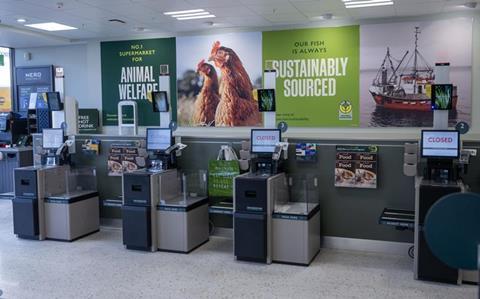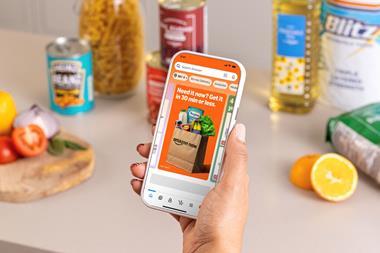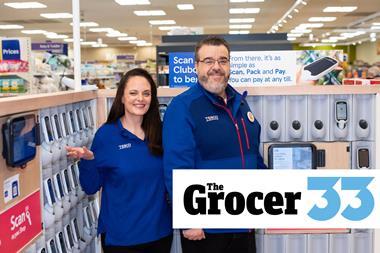It was a huge year for technology in the grocery sector, with supermarkets countering fraud, wrangling with data and testing cutting-edge kit
Suppliers refusing to pay Sainsbury’s new ‘huge’ data fees

Sainsbury’s move to charge suppliers up to £400,000 to access forecast data they had previously received from the supermarket for free did not go down well.
Store-level forecast data had been freely shared with suppliers via Sainsbury’s Horizon system, but the supermarket decided to charge for access to the information, in a move which would cost suppliers thousands of pounds, depending on their size.
The charges were met with widespread resistance, with many simply refusing to play ball.
“We fall into the camp of suppliers that refuse to pay,” one major supplier told The Grocer. “If they insist then we will just do without the data.
“A strange way to try and make money. They should stick to putting things on shelf and selling them.”
Tesco launches marketplace with thousands of third-party products

In June, Tesco launched an online marketplace, giving customers the ability to shop for thousands of third-party products alongside their groceries. When it reaches full scale, the marketplace will make Tesco.com “a one-stop shop for everything customers need” the supermarket said.
The initial launch saw around 9,000 products listed, across categories including garden, DIY, homeware, toys and petcare. Products appear alongside Tesco groceries on Tesco.com and the Tesco app, but are fulfilled directly by the supplier.
“Ultimately it all boils down to wanting to give our customers access to more than we carry,” Peter Filcek, marketplace director at Tesco, told The Grocer at the time.
Asda data breach warning after job cuts from tech team insider

A mammoth customer data breach was made inevitable, feared members of Asda’s technology function, after the supermarket culled its chief information security officer and chief data protection officer as part of swingeing head office job cuts.
A senior Asda technology function source told The Grocer that “Asda will get a massive data breach and we all know it” after the supermarket’s security leadership and teams were depleted in the move.
Asda denied there was anything to worry about, with a spokesperson adding that all key roles are “currently held by experienced colleagues and the changes announced last week will provide more clear roles and responsibilities as well as direct reporting lines for both our head office teams and our stores”.
“We have a dedicated function who work hard to ensure our internal systems and data we hold remain secure in the face of cyber-security challenges faced by all businesses,” the spokesman added.
Read more:
-
Christmas 2024 unpacked: posh turkeys, cheap veg and everything in between
-
Food, drink and fmcg’s best new launches of 2024
-
Top campaigns 2024: Who killed the traditional TV ad?
Sainsbury’s anti-fraud efforts causing friction at self-service tills

Sainsbury’s efforts to clamp down on fake discount coupons caused friction at self-service checkouts.
The supermarket made things harder for customers using self-checkout tills after rolling out new anti-fraud measures in response to a surge in the use of fake coupons.
However, the measures had unintended consequences, with self-checkouts now unable to process the yellow barcodes added to reduced-to-clear items.
Customers were annoyed and staff were put under additional strain, but Sainsbury’s moved fast and implemented a “smoother” solution earlier this month.
“We’ve listened to customer and colleague feedback and recently improved how this works, so that processing genuine coupons, vouchers and reductions at our tills is a smoother experience,” a spokesperson said.
Waitrose trialling shelf-edge cameras in bid to become sector ‘leader’ in tech

Waitrose in August began trialling the use of shelf-edge cameras to improve availability in its stores, in two Little Waitrose convenience shops.
The tech was initially being used to monitor stock levels in two Little Waitrose stores as one of a number of new solutions being tested by the high-end grocer, in preparation for a major rollout of its c-store estate.
Retail director Tina Mitchell told The Grocer Waitrose had the ambition to go from a “slow follower” to a sector “leader” in retail tech, with a major programme underway looking at how its smaller shops could be “more digitally enabled” in future.
Asda removes more than a million units of ‘phantom inventory’

Asda in May revealed it had removed more than a million units of ‘phantom inventory’ from its systems, following an estate-wide rollout of machine learning software.
The supermarket rolled out InventoryInsight software that “identifies and corrects inaccurate retailer inventory records” using a combination of machine learning algorithms and human expertise.
Running across all stores, petrol stations and depots, it has already identified 1.6 million units of the so-called phantom inventory (stock held on record but not actually available, due to theft, poor process compliance or mis-scanned items).
Aldi calls time on click & collect online shopping

In August, Aldi called time on the click & collect service it had launched in 2020, its final remaining element of online shopping.
The discounter launched click & collect in September 2020, in the midst of the online shopping boom fuelled by lockdowns in the pandemic. By 2021 it was offered from more than 200 stores.
Last year, Aldi withdrew home delivery of general merchandise and wines and spirits, a service it launched in 2015, and in 2022 it ended a two-partnership with Deliveroo involving 130 stores.
Sainsbury’s stores bombarded with coupon fraud ‘hack’

Sainsbury’s grappled with coupon fraud at its self-checkout machines this summer, with TikTok accounts sharing reusable money-off coupons that are being used to reduce basket bills to next to zero.
Dubbed ‘the Sainsbury’s method’, screenshots of specific, genuine coupons were shown being scanned over and over in a single transaction, meaning users paid pennies for their baskets.




















No comments yet